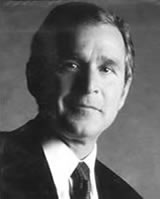|
From FirstStrikeNuts.com First-Strike Fiascos
Soon, President George W. Bush declared all-out war on global terror networks. The nineteen hijackers were associated with the al-Qaida terrorist network, led by the notorious Saudi national, Osama bin Laden. Fifteen of these hijackers were Saudis. Osama bin Laden and al-Qaida operated from Afghanistan, where the Taliban government provided them safe haven. In October 2001, the US military attacked the Taliban and al-Qaida, with support of the UN, Afghan tribal armies, and a wide coalition of nations. The Taliban was overthrown and al-Qaida was routed and dispersed. With UN assistance, Afghanistan is now developing a constitutional government. In September, 2002, the Bush administration issued its National Security Strategy of the United States of America, which asserts a US right to make unilateral preemptive first-strike military attacks upon nations or sub-national groups whom the US government fears may some day seek to harm or threaten the US, our friends, or our interests. This assertion, combined with other elements within the National Security Strategy, is known as the Bush Doctrine. (See www.whitehouse.gov/nsc.) Simultaneously, Saddam Hussein, Iraq, and weapons of mass destruction (WMD) came front and center to the world stage. (Let it be known that none of the September 11th hijackers, nor any of the known al-Qaida leadership, were Iraqi nationals.) Meanwhile, many people both within and outside of the US government had campaigned for the removal of Saddam Hussein from power in Iraq, dating back to the end of Gulf War I. Speaking for the Bush administration, Secretary of State Colon Powell informed the UN that the US had solid intelligence that WMD existed in Iraq. Others in the administration added to the constant chorus, including President Bush, Vice President Cheney, Secretary of Defense Donald Rumsfeld, and National Security Advisor Condoleezza Rice, and others. The American public, as well as Congress and the press, were “sold” on the administration’s plan for immediate military action against Saddam. An ultimatum was given to Saddam to account for fully, and to hand-over immediately, his WMD, or there would be war. He did not do so. Next, Saddam was told to relinquish power, and to leave the country along with his sons, thus averting war. Neither did they do this. In March 2003, after UN weapons inspectors in Iraq did not discover WMD, US troops along with the “coalition of the willing” (as our allies were called), invaded Iraq to remove Saddam Hussein from power. The campaign was waged with aid from Great Britain, Spain, Poland, and others, but without approval or assistance from the UN, France, Germany, and Russia, each of whom supported the US during both Gulf War I and the 2001 Afghanistan War. The 2003 Iraq campaign was swift and efficient. Euphoria ran high with the rapid defeat of the Iraqi army. Hardly a word could be heard or read in the US press opposing the invasion. In early May, President Bush announced the end of major hostilities. Next came the mammoth task of rebuilding Iraq’s infrastructure and government - and for the search for WMD. In January 2004, David Kay, the CIA’s chief weapons inspector in Iraq, returned to the USA and reported, “I’m personally convinced that there were not large stockpiles of newly produced weapons of mass destruction. We don’t find the people, the documents or the physical plants that you would expect to find if the production was going on.” He also resigned his position as chief weapons inspector. After all this was said and done, President Bush announced, “Knowing what I knew then, and knowing what I know today, America did the right thing in Iraq.” What could be more baffling than to lead your country and its allies to war on the wings of “selective” intelligence, in the face of contradictory reports from UN weapons inspectors, and then claim, when no evidence of WMD was found, that WMD really didn’t matter? But, President Bush is consistent. In his words, “This country will not permit gathering threats to become certain tragedies.” It is clear that President Bush maintains that America has the right to preemptively strike a perceived enemy, even when there is no credible evidence that the so-called enemy intends to harm us, our friends, or our interests. This is the essence of the Bush Doctrine. It is based on fear. In the calculation of President Bush, attacking Iraq in March 2003 in order to remove Saddam Hussein from power was justifiable preemptive first-strike self-defense, no matter the non-existence of WMD. And, that is precisely why this web-site exists. Who will we attack next? The question is: Are preemptive first-strikes, based upon fear that something bad may happen some day in the future, wise American policy? That is for the American public and its government to decide. And, this decision will profoundly affect our lives and those of our children, and their children, for decades to come. (July 4, 2004)
Published initially on an earlier website, July 4, 2004. XXX © Copyright by FirstStrikeNuts.com |
